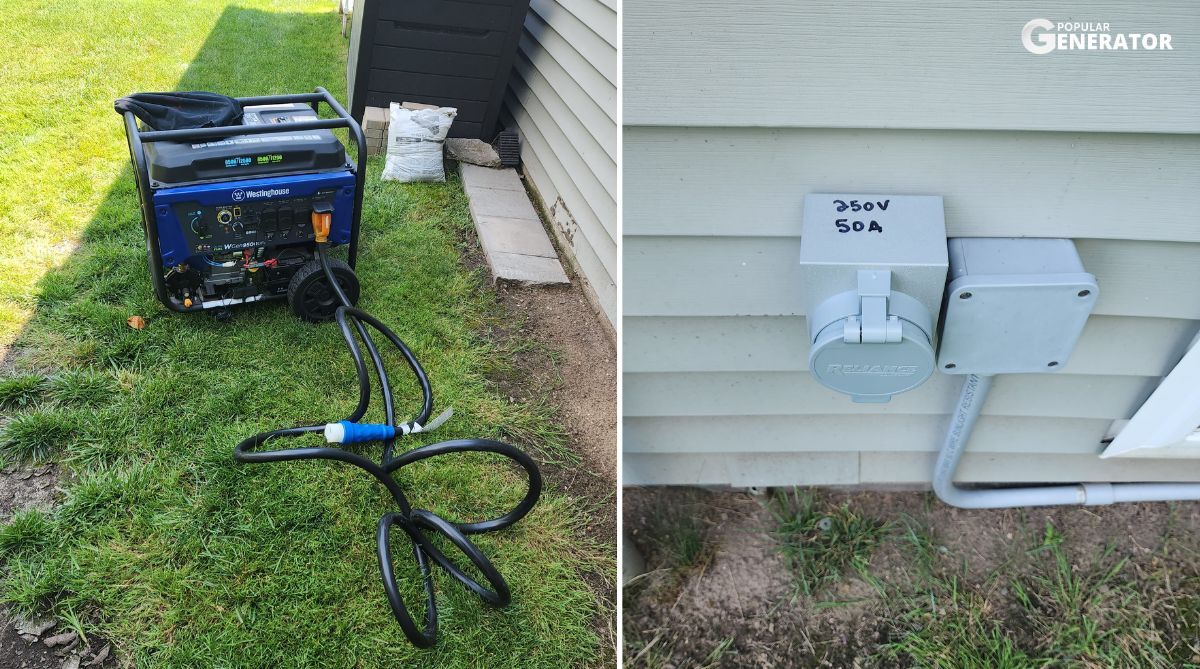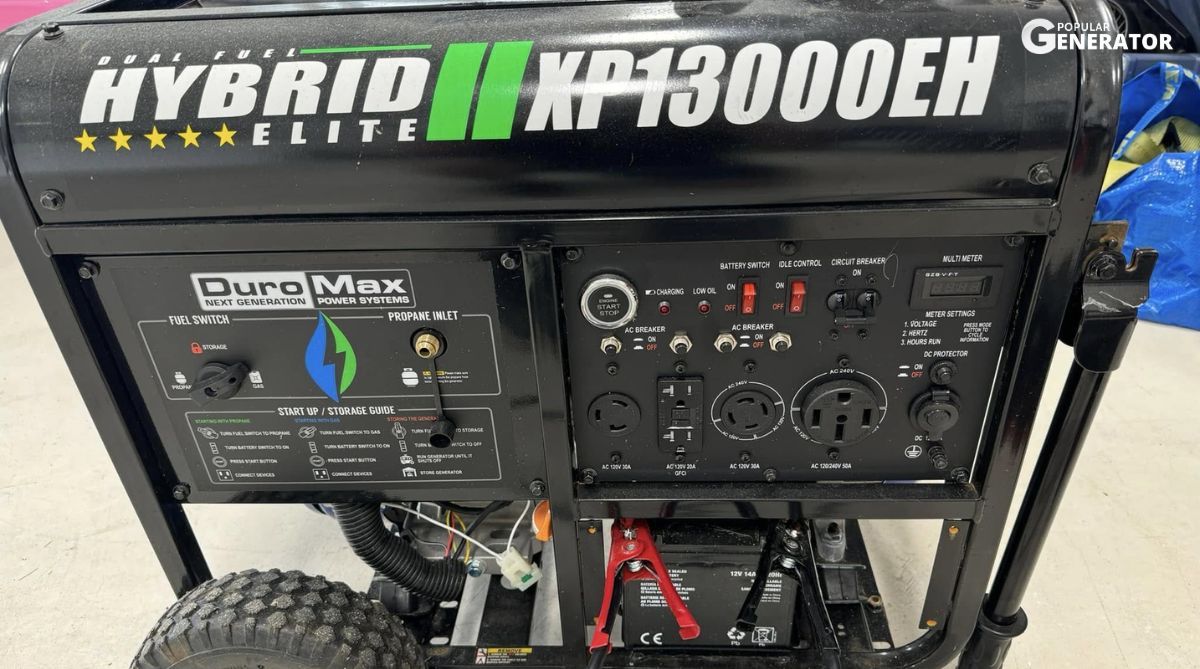What is a 50 Amp Generator?
A 50 Amp generator is a robust piece of equipment designed to deliver a significant amount of electricity, ideal for powering multiple heavy-duty appliances or tools simultaneously. It’s commonly used with RVs, at job sites, or as a backup power source for homes during outages. The “50 Amp” designation indicates its electrical capacity, which signifies how much power it can supply.
The 50 Amp rating specifically indicates the generator's capability. It is not arbitrary; it reveals the maximum power the generator can manage. Typically, a 50 Amp generator can deliver up to 12,000 watts (12 kW) or more, which is sufficient to operate high-demand appliances such as air conditioners, refrigerators, and some power tools simultaneously. Therefore, if you require substantial power, this type of generator is ideal.

There are various reasons people opt for 50 Amp generators, primarily in scenarios that demand a significant amount of power. For instance, RV owners depend on them to operate everything from microwaves to air conditioners while camping away from conventional power sources. On construction sites, they supply energy for heavy tools and equipment, facilitating work in areas without easy access to electricity. Additionally, these generators offer homeowners reassurance by keeping vital appliances functional when the power grid fails.
Wattage is a crucial aspect of 50 AMP generators. The calculation is straightforward: multiply 50 AMPs by 240 volts, resulting in 12,000 watts (12 kW). This indicates a considerable power supply, allowing multiple appliances and devices to run at once without straining the system.
Whether you're looking to maintain power at home during an outage or ensure your RV or job site has adequate electricity, a 50 AMP generator is designed for dependable, heavy-duty energy needs.
How to Choose the Best 50 Amp Generator
Selecting the appropriate 50 AMP generator necessitates a thorough evaluation of its intended application. The ideal model hinges on the specific requirements, whether for emergency home power, recreational vehicle operation, or construction site demands. This guide will delineate key factors to facilitate an informed decision.
Application assessment
The initial step involves defining the generator's primary purpose. Is its intended function to provide standby power for residential properties during outages? Alternatively, does the need stem from a portable solution for RV excursions or a robust system for powering equipment at a construction site? Each scenario necessitates consideration of varying feature sets. For residential use, sufficient power to sustain essential appliances, such as refrigerators, climate control systems, and sump pumps, is critical. RV applications necessitate a generator capable of concurrently powering multiple appliances, including air conditioning units, microwave ovens, and lighting systems. Construction sites necessitate generators designed for high-demand power tools, including saws, compressors, and drills. Accurate identification of the intended application streamlines the generator selection process, enabling efficient assessment of power output requirements and feature suitability.

Power and wattage requirements
Following the determination of the operational context, an assessment of total power demands is paramount. Generators are rated according to their wattage capacity; thus, understanding the power consumption of the appliances and tools intended for use will guarantee the selection of a generator with sufficient capacity. The following methodology can be employed for demand calculation:
- Device Inventory: Compile a comprehensive list of all devices intended to be powered by the generator. For example, if powering a residence, include the refrigerator, sump pump, lighting circuits, and heating, ventilation, and air conditioning (HVAC) systems.
- Wattage Verification: Determine the starting and continuous running wattage for each appliance. For instance, a refrigerator may require 1,200 watts at startup and 200 watts for continuous operation.
- Peak Load Calculation: Sum the starting wattage of all devices that could potentially be activated simultaneously. For example, if a refrigerator (1,200 watts), air conditioner (3,500 watts), and microwave oven (1,500 watts) are initiated concurrently, the generator must possess a minimum peak capacity of 6,200 watts.
- Continuous Load Calculation: Analyze the ongoing power requirements for operation by summing the continuous running wattages of all connected appliances while factoring in peak loads. An illustration of a total continuous load comprises: refrigerator: 200 watts, sump pump: 1,050 watts, lighting: 300 watts, HVAC: 3,500 watts --> Total running wattage = 5,050 watts.
It is imperative to ensure the generator is capable of accommodating both the starting (peak) and running wattage demands to prevent overloading and potential system failure.
Fuel type selection
Fuel type selection involves consideration of practicality and local accessibility. The following represent relative advantages and disadvantages of each fuel type.
- Gasoline: Offers accessibility and portability; however, costs may fluctuate during shortages, and gasoline does not store reliably over extended periods.
- Diesel: Provides enhanced fuel efficiency and is well-suited for heavy-duty applications. However, diesel generators are typically associated with increased noise levels and larger physical footprints.
- Propane: Exhibits cleaner combustion characteristics and extended storage capabilities; however, it requires larger storage tanks and possesses lower energy density compared to gasoline or diesel. Dual-fuel generators provide operational versatility by allowing utilization of either gasoline or propane, facilitating adaptation to fuel supply conditions. Nevertheless, such models generally exhibit increased weight and cost. Careful assessment of generator use frequency and fuel storage or transportation considerations is advisable. For situations characterized by restricted fuel accessibility, such as remote locations, a propane or dual-fuel generator may represent a more pragmatic solution. Conversely, for applications demanding robust, continuous operation, such as construction sites, diesel generators might present a superior alternative.
Portability versus stationary design
The selection between a portable and a stationary generator constitutes another significant factor. The primary characteristics are delineated as follows:
Portable generators: These are well-suited for applications requiring mobility, such as recreational vehicle usage or fieldwork. Models incorporating wheels and handles are recommended for facilitating transport. Although portability may affect fuel capacity and operational duration, these units offer enhanced versatility in deployment location.
Stationary generators: Primarily designed for residential backup power, these units are typically permanently affixed outside the residence. They provide automatic power restoration during outages and are characterized by increased power output and extended operational periods. Stationary models, however, lack portability and necessitate professional installation. The selection process should align with individual circumstances. Should mobile capability be a requirement for travel or job site applications, a portable model is recommended. Conversely, the provision of dependable home backup power deems the stationary generator a potentially superior financial investment.
Wrapping It Up
Finding the best 50 amp generators isn't about settling for the cheapest option or getting swayed by flashy peak wattage numbers. It's about matching serious power capability with your real-world needs. Whether you're keeping your RV's air conditioning running during a desert crossing, maintaining power to your home's essential systems during an outage, or running heavy equipment on a remote job site, the right generator transforms these challenges from stressful situations into manageable ones.
FAQ About the Best 50 Amp Generators
1. How much power do I really need from a 50 amp generator?
A true 50 amp generator should give you at least 10,000 running watts. That is the sweet spot for powering an RV with dual air conditioners, a home with multiple large appliances, or a job site with heavy-duty tools. You want to pay close attention to the continuous wattage, not just the peak rating, since it is the steady output that actually keeps your equipment running without tripping breakers.
2. Are 50 amp generators too heavy to move around easily?
They are big, no way around it. Most weigh in the 250 to 350 pound range. The difference comes down to whether the unit has a good wheel and handle setup. A solid set of never-flat wheels and a strong folding handle makes it a one-person job to roll around. Without that, you will be fighting the weight every time you move it.
3. How loud are these generators compared to smaller units?
With this much power, you are not going to get whisper-quiet operation. Most fall in the 72 to 78 dB range, which is like a loud vacuum cleaner. For RVers, that can be noticeable in a campground. The best 50 amp generators manage noise with larger mufflers and better engine design, but if silence is a priority, you will need to accept a trade-off in power.
4. What kind of runtime should I expect from a 50 amp generator?
On a good-sized fuel tank, usually around 8 to 10 gallons, you can expect 8 to 12 hours of runtime at half load. That is enough to get you through the night without refueling, which is a big deal if you are relying on it during a storm or running an RV air conditioner. Dual-fuel models running on propane may run a little shorter, but propane stores better and does not go bad like gasoline.
5. Is propane or gasoline better for a 50 amp generator?
Gasoline usually gives you the most power output, but it has storage issues. Propane is easier to store long term and burns cleaner, which is easier on the engine. That is why many people prefer dual-fuel or tri-fuel models. You get flexibility in case one fuel type is scarce, which is exactly what you want in a backup power situation.
6. Do I need to worry about maintenance with a 50 amp generator?
Yes, these are workhorse machines and they need regular care. Oil changes, air filter cleaning, and checking spark plugs should be part of your routine. The larger engines are built to last, but if you skip maintenance, they will let you down right when you need them most.
7. Can I plug my RV directly into a 50 amp generator?
Yes, as long as the generator has a true 50 amp outlet. Some models advertise 50 amp capability but only provide it through adapters, which is not the same. For RVs with dual AC units, a proper 50 amp outlet is a must to keep everything running smoothly without constantly juggling appliances.

















